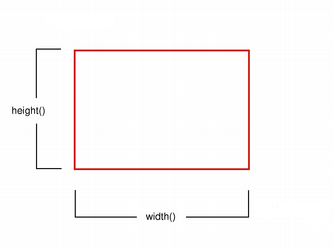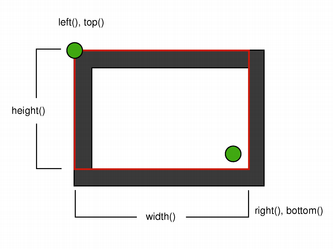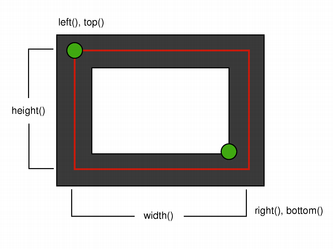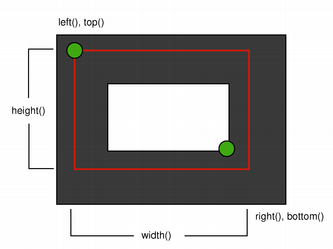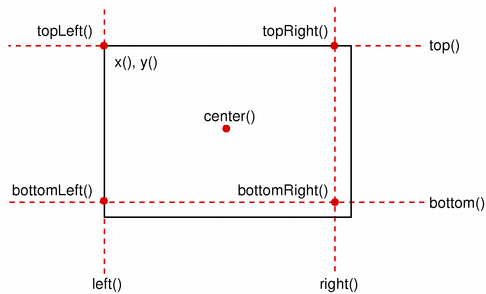Member Function Documentation
QRect::QRect()
Constructs a null rectangle.
See also isNull().
QRect::QRect(const QPoint & topLeft, const QPoint & bottomRight)
Constructs a rectangle with the given topLeft and bottomRight corners.
See also setTopLeft() and setBottomRight().
QRect::QRect(const QPoint & topLeft, const QSize & size)
Constructs a rectangle with the given topLeft corner and the given size.
See also setTopLeft() and setSize().
QRect::QRect(int x, int y, int width, int height)
Constructs a rectangle with (x, y) as its top-left corner and the given width and height.
See also setRect().
void QRect::adjust(int dx1, int dy1, int dx2, int dy2)
Adds dx1, dy1, dx2 and dy2 respectively to the existing coordinates of the rectangle.
See also adjusted() and setRect().
QRect QRect::adjusted(int dx1, int dy1, int dx2, int dy2) const
Returns a new rectangle with dx1, dy1, dx2 and dy2 added respectively to the existing coordinates of this rectangle.
See also adjust().
int QRect::bottom() const
Returns the y-coordinate of the rectangle's bottom edge.
Note that for historical reasons this function returns top() + height() - 1; use y() + height() to retrieve the true y-coordinate.
See also setBottom(), bottomLeft(), and bottomRight().
QPoint QRect::bottomLeft() const
Returns the position of the rectangle's bottom-left corner. Note that for historical reasons this function returns QPoint(left(), top() + height() - 1).
See also setBottomLeft(), bottom(), and left().
QPoint QRect::bottomRight() const
Returns the position of the rectangle's bottom-right corner.
Note that for historical reasons this function returns QPoint(left() + width() -1, top() + height() - 1).
See also setBottomRight(), bottom(), and right().
QPoint QRect::center() const
Returns the center point of the rectangle.
See also moveCenter().
bool QRect::contains(const QPoint & point, bool proper = false) const
Returns true if the given point is inside or on the edge of the rectangle, otherwise returns false. If proper is true, this function only returns true if the given point is inside the rectangle (i.e., not on the edge).
See also intersects().
bool QRect::contains(int x, int y, bool proper) const
This is an overloaded function.
Returns true if the point (x, y) is inside or on the edge of the rectangle, otherwise returns false. If proper is true, this function only returns true if the point is entirely inside the rectangle(not on the edge).
bool QRect::contains(int x, int y) const
This is an overloaded function.
Returns true if the point (x, y) is inside this rectangle, otherwise returns false.
bool QRect::contains(const QRect & rectangle, bool proper = false) const
This is an overloaded function.
Returns true if the given rectangle is inside this rectangle. otherwise returns false. If proper is true, this function only returns true if the rectangle is entirely inside this rectangle (not on the edge).
void QRect::getCoords(int * x1, int * y1, int * x2, int * y2) const
Extracts the position of the rectangle's top-left corner to *x1 and *y1, and the position of the bottom-right corner to *x2 and *y2.
See also setCoords() and getRect().
void QRect::getRect(int * x, int * y, int * width, int * height) const
Extracts the position of the rectangle's top-left corner to *x and *y, and its dimensions to *width and *height.
See also setRect() and getCoords().
int QRect::height() const
Returns the height of the rectangle.
See also setHeight(), width(), and size().
QRect QRect::intersected(const QRect & rectangle) const
Returns the intersection of this rectangle and the given rectangle. Note that r.intersected(s) is equivalent to r & s.
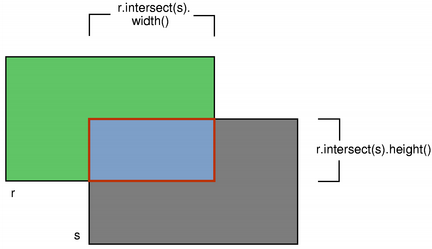
This function was introduced in Qt 4.2.
See also intersects(), united(), and operator&=().
bool QRect::intersects(const QRect & rectangle) const
Returns true if this rectangle intersects with the given rectangle (i.e., there is at least one pixel that is within both rectangles), otherwise returns false.
The intersection rectangle can be retrieved using the intersected() function.
See also contains().
bool QRect::isEmpty() const
Returns true if the rectangle is empty, otherwise returns false.
An empty rectangle has a left() > right() or top() > bottom(). An empty rectangle is not valid (i.e., isEmpty() == !isValid()).
Use the normalized() function to retrieve a rectangle where the corners are swapped.
See also isNull(), isValid(), and normalized().
bool QRect::isNull() const
Returns true if the rectangle is a null rectangle, otherwise returns false.
A null rectangle has both the width and the height set to 0 (i.e., right() == left() - 1 and bottom() == top() - 1). A null rectangle is also empty, and hence is not valid.
See also isEmpty() and isValid().
bool QRect::isValid() const
Returns true if the rectangle is valid, otherwise returns false.
A valid rectangle has a left() < right() and top() < bottom(). Note that non-trivial operations like intersections are not defined for invalid rectangles. A valid rectangle is not empty (i.e., isValid() == !isEmpty()).
See also isNull(), isEmpty(), and normalized().
int QRect::left() const
Returns the x-coordinate of the rectangle's left edge. Equivalent to x().
See also setLeft(), topLeft(), and bottomLeft().
void QRect::moveBottom(int y)
Moves the rectangle vertically, leaving the rectangle's bottom edge at the given y coordinate. The rectangle's size is unchanged.
See also bottom(), setBottom(), and moveTop().
void QRect::moveBottomLeft(const QPoint & position)
Moves the rectangle, leaving the bottom-left corner at the given position. The rectangle's size is unchanged.
See also setBottomLeft(), moveBottom(), and moveLeft().
void QRect::moveBottomRight(const QPoint & position)
Moves the rectangle, leaving the bottom-right corner at the given position. The rectangle's size is unchanged.
See also setBottomRight(), moveRight(), and moveBottom().
void QRect::moveCenter(const QPoint & position)
Moves the rectangle, leaving the center point at the given position. The rectangle's size is unchanged.
See also center().
void QRect::moveLeft(int x)
Moves the rectangle horizontally, leaving the rectangle's left edge at the given x coordinate. The rectangle's size is unchanged.
See also left(), setLeft(), and moveRight().
void QRect::moveRight(int x)
Moves the rectangle horizontally, leaving the rectangle's right edge at the given x coordinate. The rectangle's size is unchanged.
See also right(), setRight(), and moveLeft().
void QRect::moveTo(int x, int y)
Moves the rectangle, leaving the top-left corner at the given position (x, y). The rectangle's size is unchanged.
See also translate() and moveTopLeft().
void QRect::moveTo(const QPoint & position)
Moves the rectangle, leaving the top-left corner at the given position.
void QRect::moveTop(int y)
Moves the rectangle vertically, leaving the rectangle's top edge at the given y coordinate. The rectangle's size is unchanged.
See also top(), setTop(), and moveBottom().
void QRect::moveTopLeft(const QPoint & position)
Moves the rectangle, leaving the top-left corner at the given position. The rectangle's size is unchanged.
See also setTopLeft(), moveTop(), and moveLeft().
void QRect::moveTopRight(const QPoint & position)
Moves the rectangle, leaving the top-right corner at the given position. The rectangle's size is unchanged.
See also setTopRight(), moveTop(), and moveRight().
QRect QRect::normalized() const
Returns a normalized rectangle; i.e., a rectangle that has a non-negative width and height.
If width() < 0 the function swaps the left and right corners, and it swaps the top and bottom corners if height() < 0.
See also isValid() and isEmpty().
int QRect::right() const
Returns the x-coordinate of the rectangle's right edge.
Note that for historical reasons this function returns left() + width() - 1; use x() + width() to retrieve the true x-coordinate.
See also setRight(), topRight(), and bottomRight().
void QRect::setBottom(int y)
Sets the bottom edge of the rectangle to the given y coordinate. May change the height, but will never change the top edge of the rectangle.
See also bottom() and moveBottom().
void QRect::setBottomLeft(const QPoint & position)
Set the bottom-left corner of the rectangle to the given position. May change the size, but will never change the top-right corner of the rectangle.
See also bottomLeft() and moveBottomLeft().
void QRect::setBottomRight(const QPoint & position)
Set the bottom-right corner of the rectangle to the given position. May change the size, but will never change the top-left corner of the rectangle.
See also bottomRight() and moveBottomRight().
void QRect::setCoords(int x1, int y1, int x2, int y2)
Sets the coordinates of the rectangle's top-left corner to (x1, y1), and the coordinates of its bottom-right corner to (x2, y2).
See also getCoords() and setRect().
void QRect::setHeight(int height)
Sets the height of the rectangle to the given height. The bottom edge is changed, but not the top one.
See also height() and setSize().
void QRect::setLeft(int x)
Sets the left edge of the rectangle to the given x coordinate. May change the width, but will never change the right edge of the rectangle.
Equivalent to setX().
See also left() and moveLeft().
void QRect::setRect(int x, int y, int width, int height)
Sets the coordinates of the rectangle's top-left corner to (x, y), and its size to the given width and height.
See also getRect() and setCoords().
void QRect::setRight(int x)
Sets the right edge of the rectangle to the given x coordinate. May change the width, but will never change the left edge of the rectangle.
See also right() and moveRight().
void QRect::setSize(const QSize & size)
Sets the size of the rectangle to the given size. The top-left corner is not moved.
See also size(), setWidth(), and setHeight().
void QRect::setTop(int y)
Sets the top edge of the rectangle to the given y coordinate. May change the height, but will never change the bottom edge of the rectangle.
Equivalent to setY().
See also top() and moveTop().
void QRect::setTopLeft(const QPoint & position)
Set the top-left corner of the rectangle to the given position. May change the size, but will never change the bottom-right corner of the rectangle.
See also topLeft() and moveTopLeft().
void QRect::setTopRight(const QPoint & position)
Set the top-right corner of the rectangle to the given position. May change the size, but will never change the bottom-left corner of the rectangle.
See also topRight() and moveTopRight().
void QRect::setWidth(int width)
Sets the width of the rectangle to the given width. The right edge is changed, but not the left one.
See also width() and setSize().
void QRect::setX(int x)
Sets the left edge of the rectangle to the given x coordinate. May change the width, but will never change the right edge of the rectangle.
Equivalent to setLeft().
See also x(), setY(), and setTopLeft().
void QRect::setY(int y)
Sets the top edge of the rectangle to the given y coordinate. May change the height, but will never change the bottom edge of the rectangle.
Equivalent to setTop().
See also y(), setX(), and setTopLeft().
QSize QRect::size() const
Returns the size of the rectangle.
See also setSize(), width(), and height().
int QRect::top() const
Returns the y-coordinate of the rectangle's top edge. Equivalent to y().
See also setTop(), topLeft(), and topRight().
QPoint QRect::topLeft() const
Returns the position of the rectangle's top-left corner.
See also setTopLeft(), top(), and left().
QPoint QRect::topRight() const
Returns the position of the rectangle's top-right corner.
Note that for historical reasons this function returns QPoint(left() + width() -1, top()).
See also setTopRight(), top(), and right().
void QRect::translate(int dx, int dy)
Moves the rectangle dx along the x axis and dy along the y axis, relative to the current position. Positive values move the rectangle to the right and down.
See also moveTopLeft(), moveTo(), and translated().
void QRect::translate(const QPoint & offset)
This is an overloaded function.
Moves the rectangle offset.x() along the x axis and offset.y() along the y axis, relative to the current position.
QRect QRect::translated(int dx, int dy) const
Returns a copy of the rectangle that is translated dx along the x axis and dy along the y axis, relative to the current position. Positive values move the rectangle to the right and down.
See also translate().
QRect QRect::translated(const QPoint & offset) const
This is an overloaded function.
Returns a copy of the rectangle that is translated offset.x() along the x axis and offset.y() along the y axis, relative to the current position.
QRect QRect::united(const QRect & rectangle) const
Returns the bounding rectangle of this rectangle and the given rectangle.
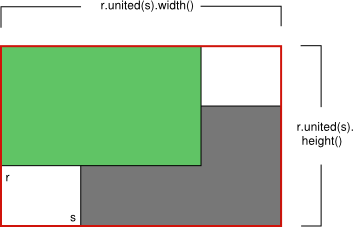
This function was introduced in Qt 4.2.
See also intersected().
int QRect::width() const
Returns the width of the rectangle.
See also setWidth(), height(), and size().
int QRect::x() const
Returns the x-coordinate of the rectangle's left edge. Equivalent to left().
See also setX(), y(), and topLeft().
int QRect::y() const
Returns the y-coordinate of the rectangle's top edge. Equivalent to top().
See also setY(), x(), and topLeft().
QRect QRect::operator&(const QRect & rectangle) const
Returns the intersection of this rectangle and the given rectangle. Returns an empty rectangle if there is no intersection.
See also operator&=() and intersected().
QRect & QRect::operator&=(const QRect & rectangle)
Intersects this rectangle with the given rectangle.
See also intersected() and operator&().
QRect QRect::operator|(const QRect & rectangle) const
Returns the bounding rectangle of this rectangle and the given rectangle.
See also operator|=() and united().
QRect & QRect::operator|=(const QRect & rectangle)
Unites this rectangle with the given rectangle.
See also united() and operator|().






















